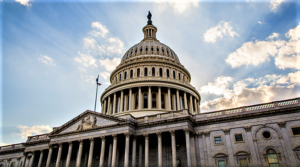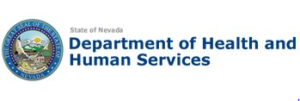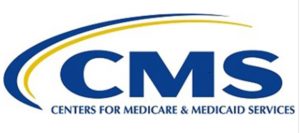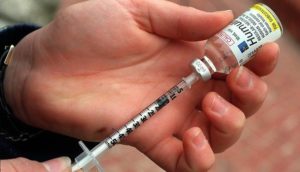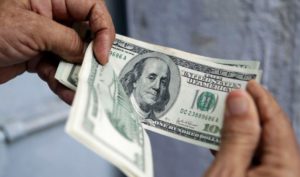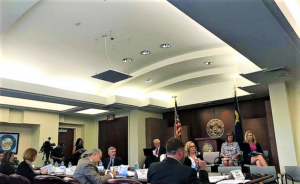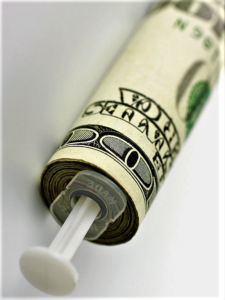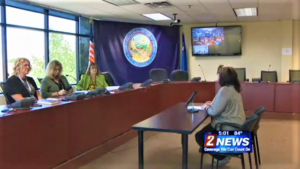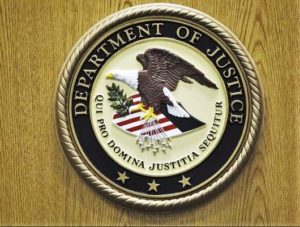- House bill seeks to create nationwide Prescription Safety Alert System (healthdatamanagement.com)
Bipartisan congressional legislation has been introduced to create a nationwide Prescription Safety Alert System to enable pharmacists to better protect patients from opioid overuse...The Analyzing and Leveraging Existing Rx Transactions Act, introduced...by Reps. Tom MacArthur, Ann Kuster and Barbara Comstock, would require the Department of Health and Human Services to work with the private sector to establish a system that analyzes the transaction data that pharmacists and payers—such as health insurers and Medicare— generate when prescriptions are filled...“We absolutely have to get smarter about how we use technology and data analysis to fight this crisis,”...“By giving pharmacists, insurance companies, and programs like Medicare a new tool to understand the data they already have, we can help prevent further harm.”...the data analysis would provide real-time feedback to pharmacists at the point of sale and would be included in their normal workflow...“A pharmacist will receive an alert that someone might be at risk of overuse based on their prescription history, or might be doctor-shopping to feed their addiction,”...“Instead of filling that unnecessary prescription, pharmacists will have an extra tool to detect and prevent these dangers.”...
- Pharmaceutical sales reps gave monetary compensation to two in five Nevada doctors they lobbied, report finds (thenevadaindependent.com)Senate Bill 539 Report: Compensation and Samples Distributed by Pharmaceutical Sales Representatives in Nevada (dhhs.nv.gov)
Two in five Nevada physicians lobbied by pharmaceutical sales representatives in the last three months of 2017 received monetary compensation, according to a report released earlier this month by the Department of Health and Human Services...The department found that 42 percent of doctors, or 396 physicians, identified in reports made to the state received some amount of monetary compensation from pharmaceutical reps between October and December, while 58 percent only received samples. But the report is also telling in what it is unable to say, with only about half of the states’ 2,572 active pharmaceutical reps detailing their doctor lobbying activities and only 13 percent of submitted reports containing enough information to tie the data back to licensed Nevada physicians...Of the small percentage of data it was able to collect and analyze, the state identified a total of 954 doctors that either received direct compensation, samples or both from pharmaceutical sales representatives, with 396 of them receiving direct compensation. (Nevada had a little under 6,000 active physicians as of March 2018.)...The report is the first formal product released as a result of Nevada’s new drug pricing transparency law. The state will be required to compile another report after it receives certain data related to the costs and profits associated with manufacturing and selling so-called essential diabetes drugs from drug manufacturers and pharmacy benefit managers, who are the middlemen in the drug pricing process...The drug lobby is continuing to challenge the constitutionality of those reporting requirements in U.S. District Court after final regulations were approved last month.
- Massachusetts grabs spotlight by proposing new twist on Medicaid drug coverage (healthcarefinancenews.com)
Massachusetts' state Medicaid program hopes to road-test an idea both radical and market-driven. It wants the power to negotiate discounts for the drugs it purchases and to exclude drugs with limited treatment value..."This is a serious demonstration proposal,"..."They're not simply using [this idea] as an excuse to cut Medicaid. They're trying to take a step toward efficiency."...If the Department of Health and Human Services approves the...plan, others will likely take similar action...Currently, state Medicaid programs are required to cover almost all drugs that have received Food and Drug Administration approval, including multiple drugs from different manufacturers used for the same purpose and in the same category. In exchange, manufacturers must discount those drugs -- typically based on a set percentage of the list price...The idea is Medicaid's vulnerable beneficiaries get medications they need and the state doesn't go broke paying for them...Massachusetts wants to go a different route, requesting a federal exemption known as a Section 1115 waiver, which is meant to let states test ways of improving Medicaid. It wants to pick which drugs it covers based on most beneficiaries' medical needs and which medicines demonstrate the highest rates of cost effectiveness...It says it will be able to negotiate better prices as a result, saving public dollars while maintaining patients' access to needed therapies...
- Nevada coalition wants drugmakers to reimburse diabetics (reviewjournal.com)
Nevadans dismayed by soaring drug prices told lawmakers...the state should take unprecedented action to curb costs...A coalition of hotel and casino owners, union leaders and Democratic lawmakers are attempting to mandate pharmaceutical companies refund people for overpriced American insulin...The bill targets diabetes medications...would require drugmakers to reimburse Nevada patients and insurers for what they pay above the highest price in other developed countries for the same prescriptions. Drugmakers would also have to reimburse people if American insulin prices increase more than inflation would suggest they should...Senate Bill 265 would require manufacturers to disclose the costs of all research, materials, manufacturing and administrative expenses that go into producing drugs for diabetics. Additionally, it would force them to notify government health agencies and insurance companies 90 days before they increase prices above the preceding year’s inflation rate...Nevada’s proposal would also have the state license all pharmaceutical sales representatives...Implementing that program in Nevada would cost about $350,000 and upkeep would cost $125,000 annually after that, according to the state Department of Health and Human Services...
- Swiss, German drugmakers join U.S. price freeze (reuters.com)
European drugmakers Roche, Bayer and Merck KGaA became the latest companies to freeze prices in the United States for the rest of 2018 following criticism by President Donald Trump over the cost of medicine...Roche did boost U.S. prices for nine key drugs by an average of 3 percent on July 1, but said it would hold off additional increases as discussions with the Trump administration continue over a longer-term solution to containing healthcare costs...The European announcements on Friday follow similar moves from Novartis, Pfizer and U.S. drugmaker Merck.
- Nevada opioid panel updated on efforts to reduce painkiller toll (reviewjournal.com)
The governor’s task force on the opioid crisis met for the second time...to receive a progress report on its efforts to rein in abuse and death resulting from prescription painkillers...Representatives of health care organizations and Nevada officials told members of the Governor’s Opioid State Action Accountability Task Force that progress was being made on four priorities identified by the panel at its first meeting...: prescriber education, treatment options, data collection and criminal justice interventions...Specifics included obtaining federal funding for three new treatment centers; development of informational presentations for schools and law enforcement; distribution of the opioid reversal drug naloxone to law enforcement; and creation of the Opioid Dashboard, a publicly available collection of state data related to the epidemic...At the task force’s third meeting in July, presenters promised to present updates on other task force goals, including identifying ways to compile real-time overdose data...
- Nevada Legislature looks to defend law against drug companies (reviewjournal.com)
The Nevada Legislature has filed a motion to intervene as a defendant in a federal lawsuit that challenges a state law that requires disclosure of how insulin is priced...Pharmaceutical Research and Manufacturers of America and the Biotechnology Innovation Organization say the Nevada law passed this year is unconstitutional. The groups maintain the legislation improperly interferes with federal patent law because the disclosure requirements it imposes penalize pricing decisions that are consistent with the patent rights granted by Congress...Gov. Brian Sandoval and Department of Health and Human Services Director Richard Whitley are named as defendants in the lawsuit. The Legislature on Tuesday filed its motion to defend the law.
- Controversial Medicaid Policy Change Proposal Being Amended After Public Feedback (ktvn.com)
A policy change proposal that could affect Medicaid's behavioral health patients drew plenty of public opposition...The policy would require prior authorization for Neurotherapy and Psychotherapy Medicaid patients to demonstrate medical necessity before they receive treatment...The Department of Health and Human Services and the Division of Health Care Financing and Policy held a workshop to hear feedback from the public about their proposal. The department says they are now revising this policy proposal, after hearing those concerns...Officials said this policy would help both the most vulnerable patients as well as the administrative staff; but opponents strongly disagreed...
- Drug Supply Chain Security: OIG Finds Pharmacies Received Most Tracing Information (raps.org)
A new report from the Department of Health and Human Services’ Office of Inspector General found that among a sample of 40 pharmacies, all received at least some of the required drug product tracing information from their supply chain partners, though many said they are not reviewing the information...Under the Drug Supply Chain Security Act, dispensers, including independent, chain and hospital pharmacies, are required to receive complete tracing information before accepting ownership of a drug shipped from a manufacturer or wholesaler...“Although dispensers are generally implementing the requirements for drug product tracing, missing information and a lack of awareness of DSCSA requirements raise concerns that a complete tracing record for a drug product may not always be available to support investigations of suspect and illegitimate drug products in the supply chain,” OIG said...OIG recommends (and FDA concurred) that FDA offer educational outreach to dispensers of drugs to ensure they understand their responsibilities in receiving complete tracing information from supply chain partners before accepting ownership of such pharmaceuticals...
- Doctors, nurses among hundreds charged with defrauding U.S. health programs (reuters.com)Sessions to Unveil Health-Care Fraud Crackdown This Week, Sources Say (bloomberg.com)
A total of 412 people, including almost 115 doctors, nurses and other medical professionals, have been charged in the sweeping enforcement action, the biggest ever by the multi-agency Medicare Strike Force, the Justice Department said...More than 120 people were accused of illegally prescribing and distributing opioids and other dangerous narcotics...Amazingly, some have made their practices into multi-million-dollar criminal enterprises...Those charged participated in schemes that billed Medicaid, Medicare and TRICARE...for unneeded drugs and treatments that were often never provided...In many cases, healthcare providers paid cash kickbacks to patients and others in exchange for medical data that would allow them to file fraudulent bills to Medicare...In addition to the hundreds charged, the Department of Health and Human Services has launched suspension procedures against almost 300 medical service providers, including doctors, nurses and pharmacists...

